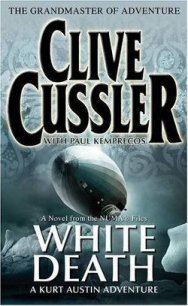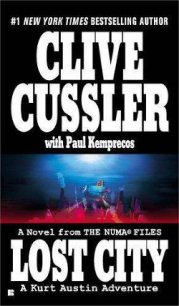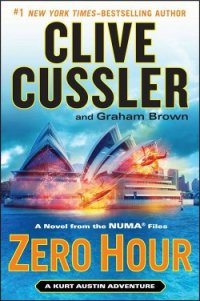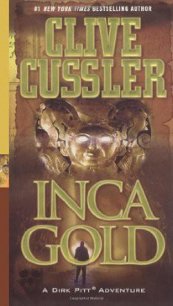The Navigator - Cussler Clive (читаем книги онлайн бесплатно полностью .TXT) 📗
“Not bad, considering the difficulties he faced,” Paul said.
“It was a sedentary and confining job,” Angela said. “But, from most accounts, he did pretty well.”
“What were the circumstances leading to his decision to go to Washington?” Gamay said.
“Lewis had repatriated a Mandan chief. There was a five-hundred-dollar cost overrun, and the federal government rejected his claim. There were rumors of a land deal scandal. Lewis said he was in a financial bind, and he had to go back to Washington to clear his good name. He had some important documents to deliver as well.”
“Tell us about the trip that ended in his death,” Gamay said.
“The whole thing is full of contradictions and inconsistencies,” Angela said.
“In what way?” Gamay said.
Angela slid a map across the desk. “Lewis leaves St. Louis at the end of August 1809. He goes down the Mississippi River and arrives at Fort Pickering, Tennessee, on September fifteenth. Lewis is exhausted from the heat and may have a touch of malaria. A rumor circulates that he was out of his head during the trip and attempted suicide. Another rumor says he drank heavily the whole time with old army comrades. That’s funny, because he didn’t have any army friends at the fort.”
“Any truth to these rumors?” Gamay said.
“They were secondhand accounts. Lewis wrote a letter at the fort to President Madison that shows he was pretty clearheaded. He tells Madison he was exhausted but that he is much better. And that he plans to go overland through Tennessee and Virginia. He says he is carrying original papers from his Pacific expedition and doesn’t want them to fall into the hands of the British, who were expected to declare war.”
“What happened next?” Paul said.
“Two weeks after he arrived at the fort,” Angela continued, “Lewis set off again. He was carrying two trunks that held his papers from the Pacific expedition, a portfolio, memo book, and documents of a private and public nature. The expedition journals are contained in sixteen notebooks bound in red morocco leather.”
“It must have been tough carrying all that stuff overland on his own,” Paul said.
“Almost impossible. Which is why he accepted an offer of an extra horse from James Neelly, a former Indian agent for the Chickasaw nation. On September twenty-ninth, they left the fort: Lewis, his servant, Pernia, and a slave, and Neelly.”
“Hardly the sort of entourage you’d expect of a territorial governor,” Gamay noted.
“I can’t figure it either,” Angela said. “Especially in light of the legend of Lewis’s long-lost gold mine.”
“The plot thickens,” Paul said. “Tell us about this mine.”
“It was said that Lewis discovered a gold mine on his Pacific expedition. He told a few friends, and supposedly left a description of the mine so that if he died it might be of some use to the country. I’m sure the gold mine story was generally known. And it was common knowledge along the Trace that the governor would be passing through.”
“Lewis would have been in special danger,” Gamay said.
“Every bandit along the Trace would have been thinking about the map and how to get it away from Lewis,” Angela agreed.
“Wouldn’t Lewis have been aware of the risk?” Gamay said.
“Lewis knew the risks of traveling through the wilderness. He had faced danger before and might have thought he could handle it.”
“Or,” Gamay said, “he could have been so driven to get to Washington that he figured the risk was worth it.’
“Maybe the danger was closer than he thought,” Paul said. “Neelly.”
“More contradictions,” Angela said. “Neelly said later that Lewis was deranged, but the group did a hundred and fifty miles in three days.”
“That’s a good trek for a crazy man,” Paul observed.
Angela nodded in agreement.
“The FortPickering commander was disturbed at reports that Neelly had urged Lewis to drink. Lewis’s Spanish servant Pernia was pushing booze on Lewis as well. Then Neelly lost two horses and told Lewis to go on ahead with the two servants while he searched for the animals.”
Gamay laughed. “If Lewis were deranged, why let him go ahead with the servants?”
“Good question,” Angela said. “But they broke up, and Lewis went on to Grinder’s Stand with Pernia and his slave servant.”
“Grinder’s Stand sounds like a place that makes submarine sandwiches,” Paul said.
“Lewis would have been better off if it had been a sandwich shop,” Angela said. “The Grinder place consisted of two cabins. Mrs. Grinder was there with her kids and a couple of slaves. Her husband was away. Lewis stayed in one of the cabins, his servants in the stable. Mrs. Grinder said that about three A.M. she heard two pistol shots—and that Lewis had shot himself in the head and the chest. Mortally wounded, he made it to her cabin, asked for a drink of water, called for help, and died a few hours later. Neelly showed up the next day.”
“Convenient,” Gamay said.
“Very. He talked to Mrs. Grinder and the servants, and a week later he wrote Jefferson and said Lewis committed suicide over his problems with the government.”
“Half the population of the country would be dead if they felt that way. Sounds fishy,” Paul said.
“It is. Lewis had been around firearms his entire life. Yet when he tried to blow his brains out, he only made a furrow,” Angela said. “He took a long-barreled flintlock and shot himself in the chest.”
“Sounds like someone shot him in the darkened cabin,” Paul said. “What do we know about Neelly?”
Angela said, “Neelly was dismissed as an Indian agent after problems with the Chickasaws. The commander at FortPickering said he was a liar and a thief. Neelly claimed he loaned Lewis money even though Lewis had a hundred twenty dollars in cash, which was missing after he died. Neelly claimed Lewis’s pistols as his own.”
“What about Pernia?” Gamay said.
“Pernia was either as a Spaniard or Frenchman. He showed up out of nowhere to travel with Lewis. Later, Neelly sent him to Jefferson with Lewis’s horse. He said he’d send the trunks to the family later, which he apparently did. Pernia went to see Lewis’s mother, who thought he had something to do with her son’s death.”
“Was there any kind of an investigation?”
“Mrs. Grinder was the only eyewitness, and she eventually told three different versions of the story. Neighbors suspected her husband had something to do with it, but when Jefferson said it was suicide that pretty much closed the books.”
“Didn’t you say that Jefferson’s finding rested entirely on Neelly’s account?” Paul said.
“That’s what’s so crazy. Jefferson told the world that Lewis was a hypochondriac when he was young, but Jefferson didn’t know him back then. He said Lewis was subject to depression, yet he sent him on the Pacific expedition. He said the depression returned when Lewis became governor, but there was no evidence of this. On the basis of hearsay, he said Lewis was deranged at Grinder’s. It doesn’t fit in with the deliberative character we think of with Jefferson.”
“I’ll go out on a limb,” Paul said. “Jefferson was using the suicide story as a cover-up. He knows it’s murder, but there’s nothing he can do, and he wants to recover the documents Lewis had for him.”
“That’s possible. Years later, Jefferson said Lewis was murdered. There’s another legend about the young slave. He died when he was about ninety-five, and, on his deathbed, he said it was murder but didn’t name names.”
Paul summed up. “So we’ve got three possibilities for the murderer. Neelly, Grinder, and Pernia. Or all three. Pernia is the strongest suspect. He had motive—Lewis owed him money. And opportunity. There’s another possibility. One or all of them were working for someone else.”
Gamay said, “Lewis was carrying something important to Monticello. We’ll assume that Lewis was murdered to prevent him from carrying out his mission. Let’s concentrate on what happened to the documents Lewis was taking to Jefferson.”




